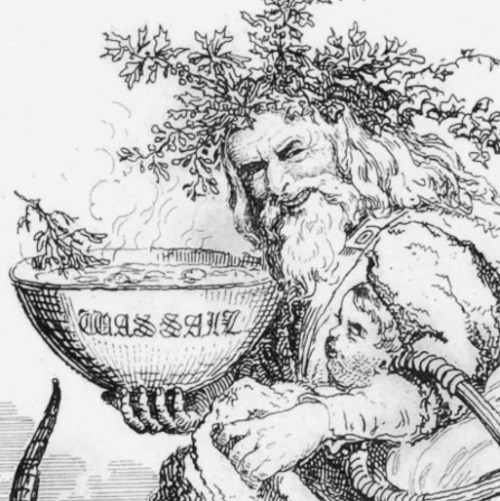Soak your toast in cider, grab your pans and wooden spoons, and head out into your nearest orchard to wassail the evil spirits away.
By Jon Wilks and Rachel Wilkinson
The word wassail derives from Old English wæs hæil which roughly translates as be you healthy or be in good health. In many counties, wassail songs are sung and performances are made to spread good cheer as well as pour libations over tree roots for good harvests. Common traditions include communal drinking, the singing of wassailing songs, dancing, and (at some of the older wassails) people firing shotguns. Common beverages for wassail include cider, hot spiced ale, wine or mead.
Apple wassailing was traditionally held in cider-making communities, so you’re more likely to find wassails in the West Country, or in the Welsh border counties. That said, it appears to be a popular tradition that increasing numbers are returning to, and – like many great traditions – is spreading across England at quite a pace.
In creating this directory of wassails, many of the organisers were first-timers, suggesting that this tradition increasingly holds meaning for many people who may be coming to it anew. People seem to be keen to connect to the land in a way that we’ve perhaps not seen for some time. Whatever the reason, it’s certainly nice to be involved in something that is non-digital, allowing the participants to look up, gaze around them, and really notice the wheel of the year. [ . . . ]
Your wassailing questions answered
Traditionally, people would have gone wassailing on the Twelfth Night (January 5th) or Old Twelvey (January 17th). These days, most wassails take place after the New Year, stretching from January through to March, and can be seen as a way of introducing a little post-Christmas communal magic in the dark and gloomy days before the sun returns.
‘Wassailing’ or ‘wassail’ is pronounced with an emphasis on the ‘sail’ part of the word. A phonetic way of writing it out would be ‘woh-say-luhng’. It can be heard clearly in many of the wassailing songs in the English tradition. “Wassail, wassail all over the town, my toast it is white and my ale it is brown.”
The word “wassail” comes from the Middle English toast, “waes hael”, meaning “be thou hale”, which in turn means “be in good health”. The phrase, “waes hael” dates back to pre-Norman times, so if you do decide to get outside and try a quick wassail, you’ll be following a time-honoured tradition. If someone says “waes hael” to you, the appropriate response is to “drinc hael”, or drink their good health [ . . . ]
Read more at source: The Tradfolk Wassailing Directory. Where to get your wassail on.

